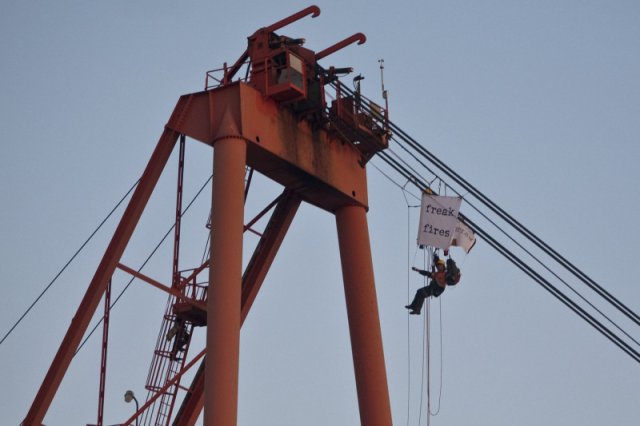
On September 26, protesters from climate change activist group Rising Tide shut down the world’s largest coal port at Newcastle. Green Left Weekly’s Zane Alcorn interviewed Rising Tide member Annika Dean.
* * *
What happened at the protest?
At dawn, nine protesters entered each of the three coal terminals in Newcastle. Some of the protesters climbed ship loaders, abseiled down structural cables and hung banners reading “coal exports fuel global warming”. Other protesters attached themselves to infrastructure at ground level.
Later in the morning, 32 community members walked onto the coal piles at the third coal terminal and occupied this area for a number of hours, holding banners and placards. We shut down the world's biggest coal port for between eight and 10 hours.
Was Rising Tide happy with the action?
We think it was an absolutely amazing achievement to shut down the world’s biggest coal port for eight to 10 hours, and it gained a lot of international media. We have held protests at “pinch points” in the coal chain in the past, which have held up large parts of the export process, but this was the first time the coal companies admitted the whole thing was shut down.
It was safe, no one got hurt — I think it was a fantastic protest.
Rising Tde also organises “the people’s blockade of the world’s biggest coal port” and your members help organise events such as the Walk Against Warming. So, you’re not opposed to a mass action approach, are you?
Not at all. We really want to see mass civil disobedience and we see it as part of our role to inspire mass direct action. In fact, many of us think that not much will change until we achieve that. But at the same time, it’s not just about rallies — direct action, which affects production, forces people to think about what we are saying.
In the longer term, say the next few years, do you think a critical mass of people could get involved — to the extent you could shut down the port with actions like this for some substantial portion of the year?
I'm not sure I can answer that … there was a lot of thought that went into making sure this action was safe and ran smoothly. It would take many more people and a lot of effort to do rolling actions of the scale you imply.
I think we need a transition out of the industry and direct action can act as a wake up call but I think we need government legislation to achieve the shift from coal to renewable jobs.
The number-one priority of these actions is to show there are masses of people who really care about this and are willing to take radical action to put pressure on the government, get the community talking about the issue and get the message out to the public.
A sub-priority is to actually shut down production — which has a small impact on emissions — but the real benefit of shutting down production is that people actually listen to you more.
The main aim is to get the government to put a moratorium on the coal expansion and get a levy on coal exports, which could be used to fund sustainable industries in coal-affected regions such as the Hunter. We need a staged phase-out plan and we need government leadership to implement it.
By the way, I should mention that even though I am a spokesperson these ideas are not necessarily the official position of Rising Tide — it is a diverse group.
What was the response of the workers to the action and to Rising Tide in general?
I can’t speak for “the workers”. But certainly some of the ones we have had contact with were very supportive of our actions. They were genuinely concerned for our well-being and were willing to talk about why we were there.
They still get paid when we are out there and I think a lot of them can see the bigger picture — they know the industry can’t go on indefinitely.
I suspect it would be very difficult for workers to openly show support for our actions. But I get the feeling they understand that we aren’t targeting their jobs, and they can see that a “just transition” that supports their jobs is in their interest.
The sooner we get it started the more just and equitable the transition will be.
What next?
Climate camp! It is happening at Liddell recreation in the Hunter Valley from December 1-5. The camp will be targeting Bayswater power station, which is one of the 12 power stations state governments are looking to build or expand. It is the equal biggest emitter of greenhouse gasses in Australia.
For more information visit http://climatecamp.org.au